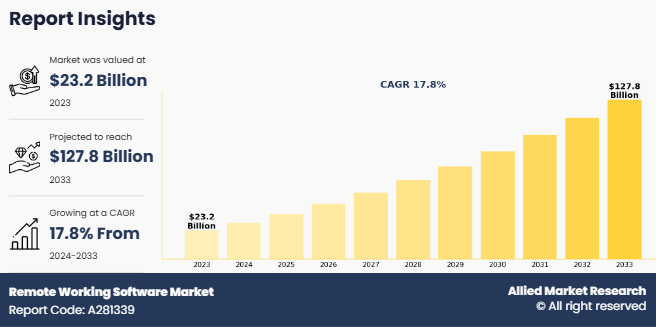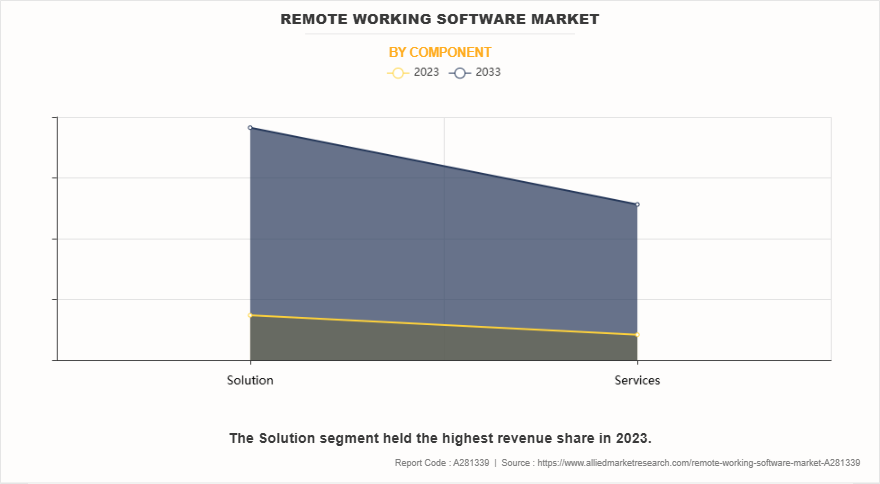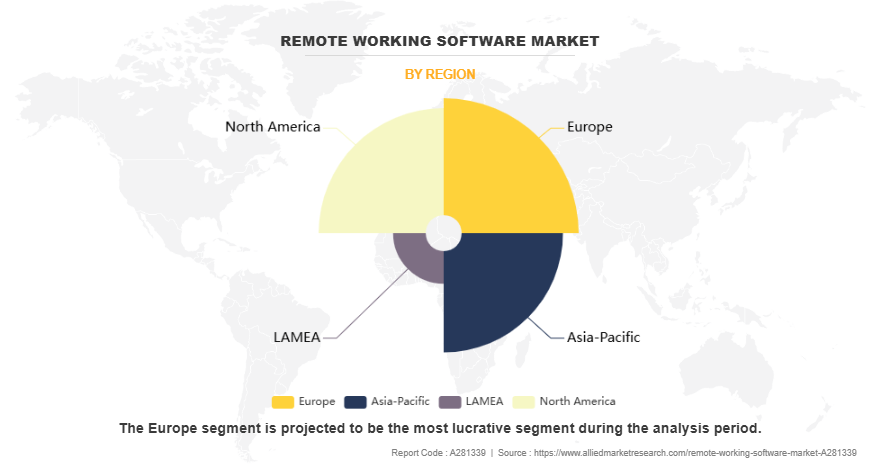Remote Working Software Market Research, 2033
The global remote working software market was valued at $23.2 billion in 2023, and is projected to reach $127.8 billion by 2033, growing at a CAGR of 17.8% from 2024 to 2033. Remote working software consists of digital tools and platforms that enable employees, teams, and businesses to work efficiently from remote locations. These solutions include communication & collaboration software, project management tools, cloud-based file storage, virtual desktop infrastructure (VDI), and cybersecurity solutions designed for remote access. The market has experienced significant growth due to rise in adoption of flexible work models, advancements in cloud computing, and increase in need for businesses to maintain operational continuity in a digital-first environment. Remote working software market is categorized into several key segments. Communication and collaboration tools, such as video conferencing, messaging apps, and virtual meeting platforms, help teams stay connected and productive.

Project and task management software ensures efficient workflow coordination, allowing teams to track progress, set deadlines, and manage workloads effectively. Cloud-based file sharing and document management solutions provide secure access to essential business data from any location, enhancing flexibility and reducing dependency on physical office infrastructure. Cybersecurity and remote access solutions, including virtual private networks (VPNs) and endpoint security, play a crucial role in protecting sensitive company data from cyber threats..
Increased demand for flexibility and cost-effectiveness for businesses are the factors expected to propel the growth of the global remote working software market. Moreover, innovation in Islamic financial products are expected to provide lucrative opportunities for the growth of the market during the forecast period. On the contrary, Cybersecurity and data privacy concerns and limited access to critical hardware and Infrastructure hamper the growth of the Remote working software market.
Key Takeaways
By component, the solution segment accounted for the largest Remote working software market share in 2023.
By deployment mode, the cloud segment accounted for the largest remote working software market size in 2023.
By enterprise size, the large enterprise segment accounted for the largest Remote working software market share in 2023.
By end user, the IT and telecom segment accounted for the largest Remote working software market share in 2023.
By age demographic, the 45 - 54 segment accounted for the largest remote working software market size in 2023.
Region wise, Europe generated the highest revenue in 2023.
Segment review
The remote working software market is segmented on the basis of component, deployment mode, enterprise size, end user, age demographic, and region. On the basis of component market is divided into solution, and services. On the basis of deployment type, the market is bifurcated into cloud based and on-premise. On the basis of enterprise size, market is divided into large enterprises and small & medium-sized enterprises. By age demographic, it is divided into 18-24, 25-34, 35-44, 45-54, and 55+. By end user, it is categorized into IT and telecom, healthcare, education and others. On the basis of region, it is analyzed across North America, Europe, Asia-Pacific, and LAMEA.

On the basis of component, the solution segment attained the highest growth in 2023 as to many businesses need reliable tools for communication, collaboration, and project management. Companies invest in software solutions such as video conferencing, cloud storage, and task management platforms to support remote work. On the other hand, the services segment is anticipated to be the fastest-growing segment during the forecast period, as businesses need help with software setup, training, maintenance, and security. As more companies adopt remote work solutions, they are projected to require expert support to ensure smooth operations, making services a key area of growth.

Region wise, Europe attained the highest growth in 2023 due to factors such as strong digital infrastructure, widespread adoption of remote work, and strict data security regulations. Many businesses in Europe have already integrated remote work solutions, leading to high demand for advanced software. On the other hand, LAMEA is expected to be the fastest-growing segment during the remote working software market forecast period as more companies are now adopting digital solutions to support remote work. With improvement in internet access, increase in smartphone usage, and business expansion in these regions, the demand for remote working software is rising rapidly, driving market growth in this region.
The report focuses on growth prospects, restraints, and analysis of the global remote working software market trend. The study provides Porter’s five forces analysis to understand the impact of various factors, such as bargaining power of suppliers, competitive intensity of competitors, threat of new entrants, threat of substitutes, and bargaining power of buyers on the global market share.
Competition Analysis
Competitive analysis and profiles of the major players in the Deel, Microsoft Corporation, Nectar, Sift Enterprise Corp., MIRO, Dialpad, Inc., TeamViewer GmbH, Slack Technologies, LLC, activtrak, activtrak, IBM, Tettra, Inc., Othership, Compass (Diligent Corporation), Loom, Inc, Teramind Inc., Zoom Communications, Inc., bitrix24, ClickMeeting, and Veriato Inc.. These major players have adopted various key development strategies such as business expansion, new product launches, and partnerships, which help drive the growth of the Remote working software market globally.
Recent Developments in the Remote working software Industry:
In August 2021, TeamViewer, a leading global provider of remote connectivity and workplace digitalization solutions, launched a range of benefitsto its channel partnersvia the newly launched partner program TeamUP. The program comes with an easy-to-use and completely new, unified partner portal.
Top Impacting Factors
Product Increased Demand for Flexibility
Rise in demand for flexible work arrangements has become a significant driver in the adoption and growth of remote working software. Modern employees increasingly prioritize work-life balance, and businesses are recognizing the value of offering hybrid or fully remote options to attract and retain top talent. This shift has created a strong need for software solutions that enable seamless communication, collaboration, and task management from anywhere. Software tools gained widespread popularity as they cater to the diverse requirements of flexible working environments. These platforms empower employees to stay productive outside traditional office spaces by offering real-time messaging, video conferencing, and file-sharing features. Moreover, flexible work arrangements have encouraged businesses to adopt cloud-based solutions that offer scalability, easy access, and secure data management. Remote working software plays a crucial role in maintaining team connectivity, streamlining project workflows, and ensuring efficient collaboration among geographically dispersed teams. As organizations continue to embrace flexible work models, demand for such software is expected to continue to grow, with an emphasis on features such as time zone management, virtual team-building tools, and performance tracking to support remote workforce productivity and boost the remote working software industry growth.
Key Benefits For Stakeholders
This report provides a quantitative analysis of the market segments, current trends, estimations, and dynamics of the remote working software market analysis from 2023 to 2033 to identify the prevailing remote working software market opportunities.
The market research is offered along with information related to key drivers, restraints, and opportunities.
Porter's five forces analysis highlights the potency of buyers and suppliers to enable stakeholders make profit-oriented business decisions and strengthen their supplier-buyer network.
In-depth analysis of the remote working software market segmentation assists to determine the prevailing market opportunities.
Major countries in each region are mapped according to their revenue contribution to the global market.
Market player positioning facilitates benchmarking and provides a clear understanding of the present position of the market players.
The report includes the analysis of the regional as well as global remote working software market trends, key players, market segments, application areas, and remote working software market growth strategies.
Remote Working Software Market Report Highlights
| Aspects | Details |
| Market Size By 2033 | USD 127.8 billion |
| Growth Rate | CAGR of 17.8% |
| Forecast period | 2023 - 2033 |
| Report Pages | 419 |
| By Deployment Mode |
|
| By Enterprise Size |
|
| By Component |
|
| By End-User |
|
| By Age Demographics |
|
| By Region |
|
| Key Market Players | Dialpad, Inc., iCompass (Diligent Corporation), Nectar, Othership, Hive, Loom, Inc, TeamViewer GmbH, Microsoft Corporation, MIRO, Slack Technologies, LLC, Sift Enterprise Corp., IBM, ActivTrak, Veriato Inc., Tettra, Inc., ClickMeeting, Deel, Bitrix24, Zoom Communications, Inc., Teramind Inc. |
Analyst Review
The remote working software market has grown significantly, driven by the increase in adoption of flexible work models and digital transformation across industries. Organizations are increasingly relying on remote collaboration tools to maintain productivity, streamline communication, and ensure business continuity. Remote working software includes a wide range of solutions, such as video conferencing, instant messaging, cloud-based file storage, project management software, and remote desktop access tools. The shift to hybrid and fully remote work environments has made these technologies essential for businesses of all sizes, enhancing efficiency and connectivity among distributed teams. The significant market trends include surge in integration of artificial intelligence (AI) and automation to enhance user experience, improve workflows, and reduce repetitive tasks. In addition, cloud-based collaboration platforms have become the preferred choice for organizations, offering scalability, remote accessibility, and seamless integration with other business applications. Companies prioritize cybersecurity solutions, such as endpoint protection, multi-factor authentication, and virtual private networks (VPNs), to safeguard sensitive business data in remote work settings. Despite its rapid expansion, the market faces challenges, including cybersecurity threats, data privacy concerns, and the digital divide in regions with limited internet infrastructure. Organizations must implement robust security measures and compliance strategies to mitigate risks associated with remote work. In addition, managing employee engagement, productivity tracking, and collaboration in a virtual setting remain key concerns for businesses transitioning to long-term remote or hybrid work models. However, opportunities in the market are expanding, particularly in the development of AI-driven virtual assistants, enhanced cloud-based productivity suites, and industry-specific remote work solutions tailored to sectors such as healthcare, education, and finance. The demand for affordable and integrated remote working software among small and medium-sized enterprises (SMEs) drives innovation in cost-effective solutions. As businesses continue to invest in digital work environments, the remote working software market is poised for continued growth, shaping the future of workplace collaboration and productivity. For instance, in September 2024, Zoom Communications, Inc. and Mitel, a global leader in business communications, announced the global launch of a unique hybrid cloud solution that integrates Zoom Workplace and Zoom AI Companion with Mitel’s flagship communications platforms, including its leading telephony solutions. Organizations are navigating the adoption of emerging technologies such as AI while maintaining security, business continuity, and flexibility when modernizing business communications. This new solution is designed to meet the growing enterprise demand for hybrid unified communications (UC) deployments by offering a “best-of-both-worlds” approach that empowers organizations to deliver mission-critical communications capabilities alongside exceptional collaboration functions to enhance business productivity.
The global remote working software market was valued at $23.2 billion in 2023, and is estimated to reach $127.8 billion by 2033, growing at a CAGR of 17.8% from 2024 to 2033.
Increased Demand for Flexibility is the upcoming trend of the Remote Working Software Market in the globe.
Growing Adoption of Hybrid Work Models is the leading application of the Remote Working Software Market.
Europe is the largest regional market for Remote Working Software.
Deel, Microsoft Corporation, Nectar, Sift Enterprise Corp., MIRO, Dialpad, Inc., TeamViewer GmbH, Slack Technologies, LLC, activtrak, activtrak, IBM, Tettra, Inc., Othership, Compass (Diligent Corporation), Loom, Inc, Teramind Inc., Zoom Communications, Inc., bitrix24, ClickMeeting, and Veriato Inc. are the top companies to hold the market share in Remote Working Software.
Loading Table Of Content...
Loading Research Methodology...



